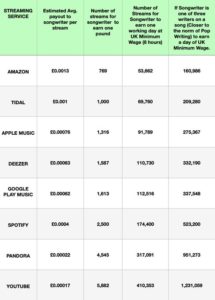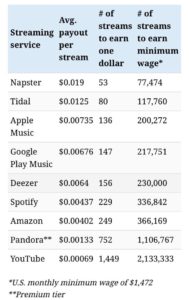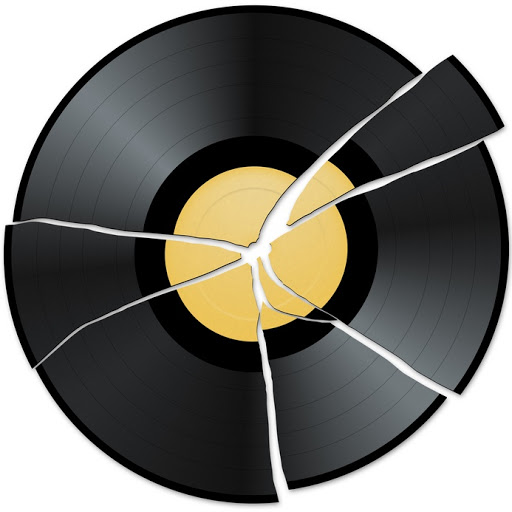A few weeks ago Tom Gray a PRS director, a musician in his own right, solo and as a member of Gomez, and also part of the Ivor Academy, posted a stream of tweets about the #BrokenRecord industry and how we could potentially #FixStreaming. The issue has become even more urgent and desperate in the midst of the COVID-19 crisis where live music has been shut down and is currently not a revenue stream for artists.
He tweeted:
“I hope it’s not wrong of me to assume that most people don’t know or fully understand how musicians get paid. Truth is, I know an awful lot of musicians that don’t understand how they get paid. We can’t expect our legislators or, more importantly, consumers to demand change on our behalves when it is such an annoyingly complex picture.
However, everything is getting desperately clear.
The ways in which we make money are disappearing and the inequities of the recorded music business are being severely exposed. First of all, let’s consider touring as a means of income, well it’s gone. Done. Nada. The next way artists, players and songwriters are rewarded is through a ‘Performance Royalty’ for writing and something else called ‘Equitable Remuneration’ for performance. That they appear to have the wrong names is one of the many ways in which this problem can prove obscure.
These royalties originate from licenses for your work to be played in public. TV stations, pubs, clubs, hairdressers and music venues in the UK will be very familiar with paying these licenses.
So what is about to happen? Businesses, shops etc will not be able to pay for those licenses in increasing numbers. Commercial TV stations will see their advertising revenues fall and ask to pay less for their broader performance licenses. And with the collapse of touring, and the music venues not paying, the artists and writers will be doubly hit by the disappearance of the related royalties.
Which leaves the only remaining constant way that we get paid at all. The recorded music business. You’d imagine that what most people think of as ‘the music business’ would pay musicians right? , it turns out that if you subtract the other ways in which we’ve sought to pay rent, there really isn’t a lot of people making much money at all from a business that generates 10s of Billions in profits for the people who built the system.

Here are the money splits from streaming: Streaming company keeps 30%. The Recording gets 57%, the Song gets 13% (of which publishers get 20-25%). So that’s 8-10% that goes to the writers of which, on any song, there may be multiple. What an artist earns from that 57% varies enormously.
A few self-releasing and successful artists do very well out of this situation. But most artists labouring under Major Label contracts are unlikely to make as much as 50% of it. 20% in most cases. When you consider how little the money earns from each stream (approx £0.005 per play), you need a lot of plays to make any kind of money.
We do not get a fair cut.
How did we get here? The recording industry used to have massive overheads. Shipping, packing, manufacture, marketing, distribution. These costs are still built-in even though they do not objectively exist. In fact, many labels still pay to artists based on 90% earnings because they hold back 10% for ‘breakages’ (when they used to pack vans with vinyl and there were inevitable casualties).
The other big question here is ‘what is streaming?’ The record business claims that it is reproduction and so all the money goes to them, but, even to the idle observer, much of what streaming does looks a lot more like broadcasting.
When your streaming service picks a song for you do you feel like you made a purchase or like you’re listening to the radio?
If we accept the broadcast model for 50% of the streaming business, they would pay licenses and we’d get paid through performance royalties (both types described). The money would come straight through to artists/players/writers and not go through the (often vague) books of labels.
Getting to a place where the recording business pays fairly has to be in the interests of everyone involved. Maybe not the shareholders of Major Labels, but just about every single other individual in our profession. It would begin to rebuild the lost middle class of the music industry and establish a healthy system that could weather these kinds of calamities.
We need to start the pressure now. We need to move on this. It’s not crass, it’s about survival and justice in an industry that has been able to play fast and loose for far too long with the talents of others for extraordinary profits.
It’s a #brokenrecord business.”
This thread took off with over a million impressions and now the issue is being discussed across social media, and a campaign is forming. So we spoke to Tom asking him to explain some of the points on the #BrokenRecord industry and how we could potentially #FixStreaming.
First of all thank you for answering these questions. With the twin drop in live touring and revenues amidst the COVID crisis, what urgently needs to change in order to get more of the profits to the artist and creators?
The platforms and Major Labels need to come to the table with creators and re-negotiate the division of payment. It most probably will require a 25% price rise across the board in the streaming market.
Can you explain the current split from streaming that artists receive and why you think some streaming revenues should come under broadcasting revenue in future?
The current split: Of all money says Spotify, receives from subscription and ad revenue, they keep 30% off the top. Of what remains 57% go to the master rights, so depending on an artist’s label deal they may get 20-30% of that (though if independent they may take it all). The remaining 13% goes to the song in the form of performance and mechanical royalties. Writers will usually get 80% of this figure with their publisher keeping 20%, though it’s worth noting there are typically numerous songwriters on any given song. At present, non-featured musicians on any track receive absolutely nothing.
I don’t think streaming should come under broadcasting exactly. I’m suggesting that it should perhaps be a mixed service. It already is. When you choose the music and when it chooses the music for you. When it chooses music for you, does that feel more like a purchase or like your radio? The benefit in a percentage of streaming money going through broadcast licensing is money will go directly to artists, writers and, significantly, non-featured musicians, with the label getting a smaller cut than they do in the present system.

You talk of the inequalities and unfairness of the music industry do you think these issues are sometimes brushed over because some artists are afraid of upsetting the very platforms they rely on?
I do talk of inequalities and unfairness, but I agree these feel ethical and political. It is part of the emotional conversation, but, again significantly, I’d like to talk more about how the consumer is being let down. How their money doesn’t go to their choices, and how streaming is unsustainable in the present situation, and will ultimately lead to them losing choice. 80% of an average Spotify listener’s money goes to music they do not listen to.
Also, the talk in recent years has been how streaming has been a positive for the industry there has been less talk about how the money is shared between label, publisher, songwriter, and artist? Less talk of how revenues to artists do you think the fault in live touring for the foreseeable has shone a sharp light on how unsustainable this is?
100%. Live is dead and is going to be dead for a long time. Even when lockdown ends are people going to want to lock themselves in black boxes with strangers? I have sincere doubts about that. Also with the collapse of the economy are we likely to see the kind of disposable income that allows for expensive concert tickets? We are left with one dependable income stream, therefore it has to be sorted out. It always did. Songwriters were in very serious trouble well before Covid19.
You say you as artists can’t demand change if they don’t understand the complex picture of how music royalties are split. Is it also the case that artists should be forming groups that should be pressuring labels, governments, and tech giants (like Google, Apple, Youtube, Spotify) for change? In what ways could labels practically assist artists? Do you think the musicians union could have more teeth to protect creators?
I think they do have teeth. I think there has been a ‘don’t bite the hand that feeds’ attitude for many years and a profession who are kept ignorant of their rights by over-stated complexity. There have historically been very many bad actors: Managers, Lawyers, Accountants, A&R amongst them who have assured artists that it is above their pay grade to get this stuff. They’re liars. You can break it down. You can dispose of double-speak. This stuff can be grasped and artists can feel empowered. The moment calls for us all to use the teeth we always had.
Spotify particularly seems focussed on how to build its brand and uses music as one part of that is there a way fans can demand /drive change too? Maybe there is scope for new streaming platforms to emerge? If fans want to support artists is buying records directly from the artist still the best way to do it?
For the time being sadly, yes. Though Streaming can and should be fixed. If they refuse to negotiate we need to force the hands of regulators. The amount of cartel behaviour in our market is jaw-dropping. They call it ‘market alignment’ but it is anti-competitive. Whenever platforms try to progress things they get shut down by one of the major labels. I direct you to look into what happened to Deezer’s attempts to introduce Usercentric (where your money goes to your music) into their payment model. I’d be amazed if you can get a straight answer.
As a musician yourself solo and with Gomez, was your experience as a young musician in an up and coming band different to those that independent artists experience today and in what ways both better or worse?
We had to contend with the dark days of the Standard Record Contract. We lost our rights forever and even when the courts decided those contracts were illegal, they left our copyrights with the companies for what feels like a lifetime. Essentially saying, yeah it was okay these companies got young people to sign illegal contracts. Thankfully those days are over. Hang onto your master rights kids.
What has been the response to your thread?
Wild. I wrote it on a Saturday morning and now it’s had about 1.3 million impressions. Every day there’s close to 200 tweets using the hashtag #BrokenRecord. It’s brilliant. It’s turning into a serious campaign with The Ivors Academy and Musicians Union both on board.
What do you see as the big post COVID challenges to rebuilding a middle tier of artists in the industry and maintaining the independent music ecosystem of labels, venues, and record shops?
Usercentrics. Increasing the amount we pay for streaming marginally: Stop saying it’s price-sensitive; Kids pay £8 for a skin in Fortnite and we can’t ask for £12.50 for the entirety of all recorded music? Give me a break.
As for the independent labels go 50/50 with your artists across the board. It was always the ethical way.
We need to support our record shops through their online businesses.
I’m truly terrified for the venues and I don’t know what the answer is. I’m that knobhead who typically thinks he has an answer for everything. This is way beyond me. I hope we find away.
Cheers,
Tom




